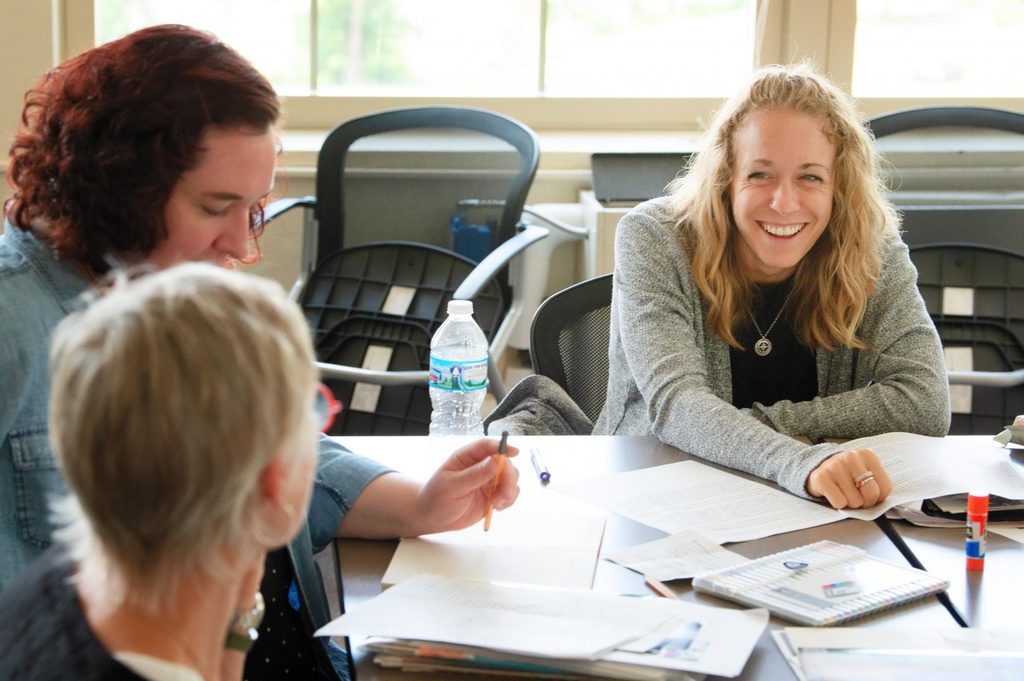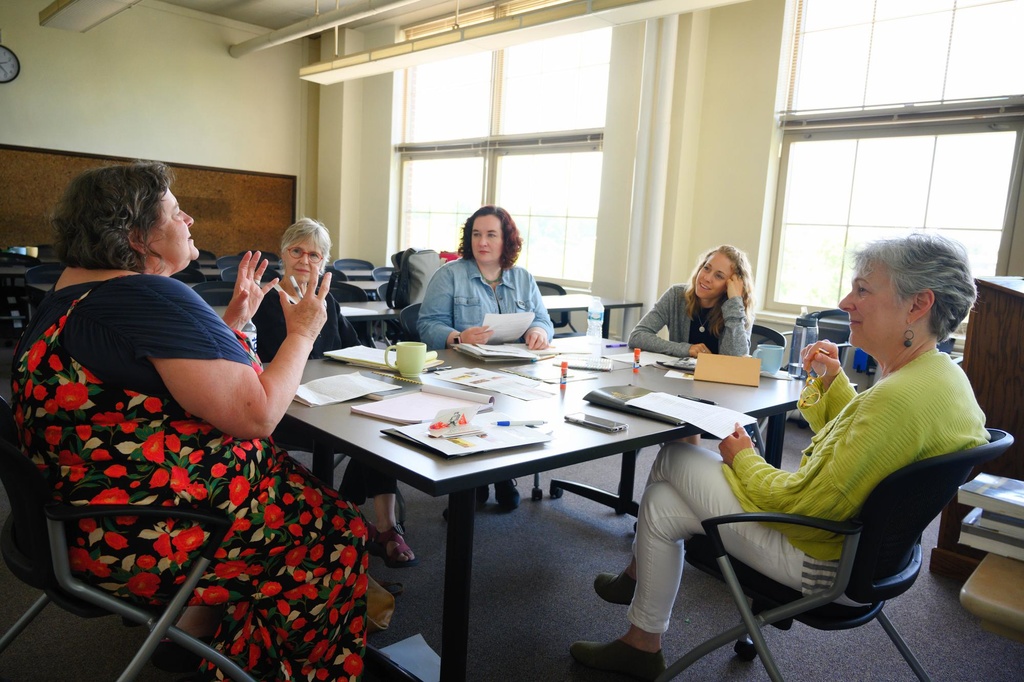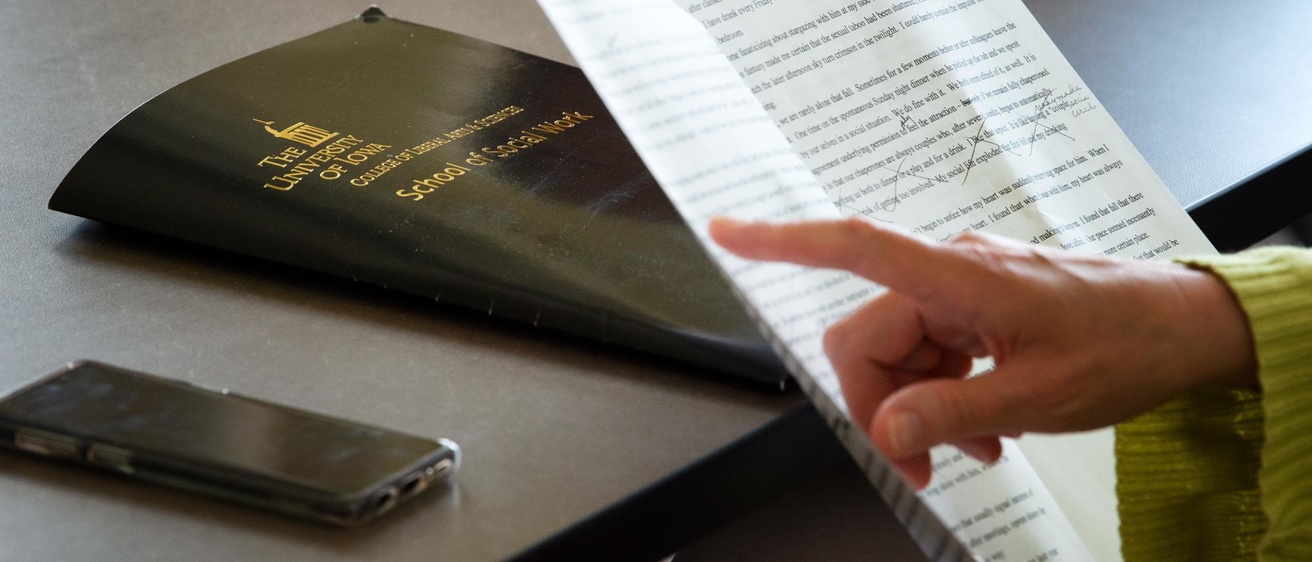It is fitting that a class that teaches social workers the therapeutic value of writing would be offered on a campus renowned for its writing programs.
The Creative Writing Seminar for Social Workers was the brainchild of Tom Walz, former director of the School of Social Work.
Learn more about the Creative Writing Seminar for Social Workers or Creative Writing Master Class for Social Workers here.
Find other creative writing programs available at Iowa here.
“Tom told me the whole reason he created the class was because he was immersed not just in social work, but in this world of creative writing,” says Ellen Szabo, the primary writing instructor in the course.
“He loved social work and creative writing equally,” Szabo says.
Twenty-nine years after its founding in 1990, the Creative Writing Seminar for Social Workers continues during summers at the University of Iowa. The purpose of the course is to teach social workers and professionals in related fields how to harness the healing value of writing.
Its popularity, and numerous requests for a follow-up course, resulted this summer in an inaugural master class. Actually, two classes: the first one filled immediately.
Szabo says she discovered the seminar a few years after it began.
“I was interested in using creative writing as a therapeutic tool in my private practice,” Szabo says. “A friend told me about this class at the University of Iowa. I took it and Tom Walz asked me to come teach it with him the next year. It was the start of an amazing mentorship.”
The seminar is based on studies that have shown when people write without inhibition about emotional experiences for a specified period each day, they can experience significant physical and mental health improvements. Szabo says many of these researchers believe that it’s not only the process of expressive writing that’s important, but the process of making meaning of our experiences and transforming our perceptions.
“This is not about being a perfect writer; it’s about finding your voice and writing expressively,” Szabo says. “It’s really designed to find the joy in creative writing and guide people through the process of discovering how metaphor can really be a vehicle for externalizing your inner apocalypse. And everyone has an inner apocalypse, no matter how happy you are.”

Participants in the original four-day seminar spend the mornings with guests who talk about their research into the effects of creating writing or how they use creative writing in their own practices working with patients with Alzheimer’s disease, caregivers, homeless populations, and others.
In the afternoons, participants write based on prompts from Szabo, who then facilitates a discussion about what they wrote. It’s made clear at the beginning of class that the conversations are confidential.
“My prompts are pretty wild and crazy because I want people to be comfortable writing whatever comes,” Szabo says. “I teach people to write effectively, but always in a context of writing to feel better.”
Often, one or two graduate students take the class for credit. However, the majority of the participants are professionals in their fields—mostly social workers, but also therapists, nurses, and teachers who come from across the country.
“The class is open to anyone who would like to use creative writing to facilitate the work they’re doing with any kind of client or patients,” Szabo says.
Szabo and Kate Kemp, programs and admissions administrator for the School of Social Work, say they are unaware of any similar programs in the country.
“Schools of social work may offer courses that include discussion of the use of writing as a therapeutic tool, but this workshop not only provides participants with an array of narrative approaches to working with clients, but it also aims to empower the social worker to become an effective writer,” Kemp says. “Social workers have amazing stories to tell—about their clients’ struggles and successes, about the need for social justice and social change. This creative expression can take myriad forms.”
Martha Schut enrolled in the seminar about a decade ago. She says she was looking for new methods to help people in their healing and growth at her small psychotherapy practice. Learning to allow deep feelings to run free by writing without worrying about punctuation, spelling, or grammar made a deep impression on her.

The lessons she took from the seminar not only helped her practice but her personal life as well.
“Ellen asked us to choose a postcard from many that were spread out on the table in front of us, study it for a few minutes, and then write a story about it,” Schut says. “I chose a sepia photo of an aged Annie Oakley-type woman with a rifle tucked under her arm. I don’t remember the story I wrote, but rather that dementia patients could benefit from this type of exercise as they have nothing to remember, no names, dates, occasions, relationships. Instead of worrying if they are remembering correctly or not, they have complete freedom to create anything they would like. This was helpful in understanding my mother’s needs, who at age 90 was experiencing dementia.”
Schut says she began encouraging clients to journal with a freewriting perspective in mind.
“There is great honoring of one’s feelings when they are placed on a page in black and white, and a clarity that also appears,” Schut says.
Szabo says seminar participants also learn to practice expressive writing themselves as a means to process the difficult issues often encountered in their jobs.
Szabo says she loves seeing people come into the seminar thinking they can’t write, and then leave with newfound confidence in their skills. But there’s something even more exciting to Szabo.
“The other thing that is even more important to me is when they say they’ve been changed or transformed by this experience,” Szabo says. “I want people to learn how to do this so they can take it out in the world and teach others to do it, but in my heart of hearts I keep coming back because I get to witness these amazing transformations in people who take the class.”
While enrollment numbers are not available between 1990—when the Creative Writing Seminar for Social Workers began—and 2001, there have so far been 538 participants since 2001.
The School of Social work has received numerous requests over the years for a follow-up class.
“We formed the master class because we found that people who took the original class then wanted to be in an immersive creative writing workshop designed to support people and be really joyful but also deeply instructive in creative writing,” Szabo says.
The two-day master class filled so quickly, a second session was added. Schut, who retired from her practice in 2014 and splits her time between Iowa City, Iowa, and a residence near Assisi, Italy, was quick to sign up.
“After the first seminar, I started writing more, jotting something most days, a practice of sorts, crafting some into poems,” Schut says. “I am hoping to find a fuller voice for my poems, and Ellen has a nonjudgmental, uncanny ability to find the essence of what we are trying to express.”
Szabo says the master class includes a brief refresher of material covered in the original seminar, but participants quickly launch into writing. She encourages participants to send her anything they have been working on before the class so she can get to know their writing, but that isn’t a requirement.
“This is more of a writing workshop,” Szabo says. “I still model it on a write better, feel better model, but it is much more focused on students’ work with an intensive focus on guided discussion of what students are doing and what they want to accomplish.”
Even though the master class focuses on the craft of writing, Szabo says the aim is different from many other creative writing programs and workshops at the Writing University.
“I’m incorporating creative writing techniques, and when I give feedback, I’m honest,” Szabo says. “But my purpose is not necessarily in getting people to be publishable—although some of them do go on to be published. My mission is very different. My mission is, ‘Let’s get you feeling better,’ or, ‘Let’s get you helping others to feel better.’”
